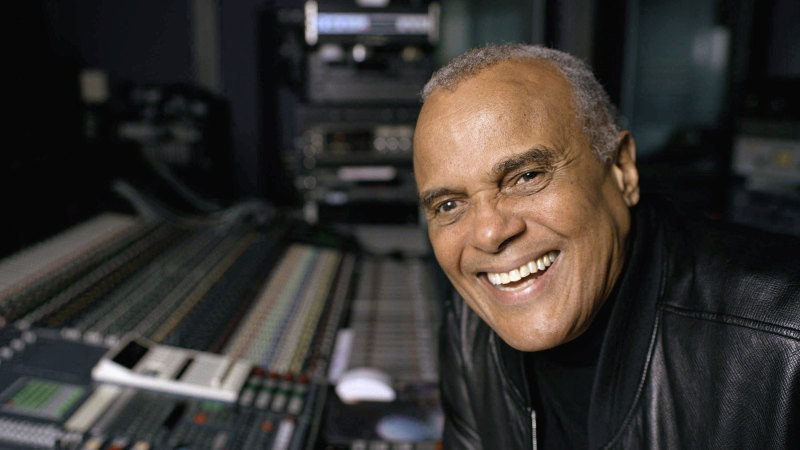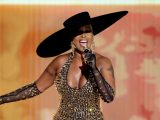
Harry Belafonte, entertainer and civil rights activist, dies at 96
04/25/2023Save articles for later
Add articles to your saved list and come back to them any time.
New York: Harry Belafonte, the civil rights and entertainment giant who began as a groundbreaking actor and singer and became an activist, humanitarian and conscience of the world, has died. He was 96.
Belafonte died on Tuesday (US time) of congestive heart failure at his New York home, his wife Pamela by his side, said publicist Ken Sunshine.
Actor and singer Harry Belafonte poses at a New York recording studio in 2001.Credit: AP
With his glowing, handsome face and silky-husky voice, Belafonte was one of the first Black performers to gain a wide following on film and to sell a million records as a singer; many still know him for his signature hit Banana Boat Song (Day-O), and its call of “Day-O! Daaaaay-O.” But he forged a greater legacy once he scaled back his performing career in the 1960s and lived out his hero Paul Robeson’s decree that artists are “gatekeepers of truth”.
Belafonte stands as the model and the epitome of the celebrity activist. Few kept up with his time and commitment and none his stature as a meeting point among Hollywood, Washington and the civil rights movement.
Belafonte not only participated in protest marches and benefit concerts, but helped organise and raise support for them. He worked closely with his friend and generational peer the Reverend Martin Luther King jr, often intervening on his behalf with both politicians and fellow entertainers and helping him financially. He risked his life and livelihood and set high standards for younger Black celebrities, scolding Jay-Z and Beyoncé for failing to meet their “social responsibilities”, and mentoring Usher, Common, Danny Glover and many others. In Spike Lee’s 2018 film BlacKkKlansman, he was fittingly cast as an elder statesman schooling young activists about the country’s past.
Belafonte’s friend, civil rights leader Andrew Young, would note that Belafonte was the rare person to grow more radical with age. He was ever engaged and unyielding, willing to take on Southern segregationists, Northern liberals, the billionaire Koch brothers and the country’s first Black president, Barack Obama, whom Belafonte would remember asking to cut him “some slack”.
Belafonte addresses the “One Nation Working Together” rally at the Lincoln Memorial to promote job creation, diversity and tolerance in 2010.Credit: AP
Belafonte responded, “What makes you think that’s not what I’ve been doing?”
Belafonte had been a major artist since the 1950s. He won a Tony Award in 1954 for his starring role in John Murray Anderson’s Almanac and five years later became the first Black performer to win an Emmy for the TV special Tonight with Harry Belafonte.
In 1954, he co-starred with Dorothy Dandridge in the Otto Preminger-directed musical Carmen Jones, a popular breakthrough for an all-Black cast. The 1957 movie Island in the Sun was banned in several Southern cities, where theatre owners were threatened by the Ku Klux Klan because of the film’s interracial romance between Belafonte and Joan Fontaine.
His Calypso, released in 1955, became the first officially certified million-selling album by a solo performer, and started a national infatuation with Caribbean rhythms (Belafonte was nicknamed, reluctantly, the “King of Calypso”). Admirers of Belafonte included a young Bob Dylan, who debuted on record in the early ’60s by playing harmonica on Belafonte’s Midnight Special.
“Harry was the best balladeer in the land and everybody knew it,” Dylan later wrote. “Harry was that rare type of character that radiates greatness, and you hope that some of it rubs off on you.”
Belafonte befriended King in the spring of 1956 after the young civil rights leader called and asked for a meeting. They spoke for hours, and Belafonte would remember feeling King raised him to the “higher plane of social protest”. Then at the peak of his singing career, Belafonte was soon producing a benefit concert for the bus boycott in Montgomery, Alabama that helped make King a national figure. By the early 1960s, he had decided to make civil rights his priority.
“I was having almost daily talks with Martin,” Belafonte wrote in his memoir My Song, published in 2011. “I realised that the movement was more important than anything else.”
The Kennedys were among the first politicians to seek his opinions, which he willingly shared. John F Kennedy, at a time when Black voters were as likely to support Republicans as they would Democrats, was so anxious for his support that during the 1960 election he visited Belafonte at his Manhattan home. Belafonte explained King’s importance and arranged for King and Kennedy to meet.
“I was quite taken by the fact that [Kennedy] knew so little about the Black community,” Belafonte told NBC in 2013. “He knew the headlines of the day, but he wasn’t really anywhere nuanced or detailed on the depth of Black anguish or what our struggle’s really about.”
Belafonte would often criticise the Kennedys for their reluctance to challenge the Southern segregationists who were then a substantial part of the Democratic Party.
In 1963, Belafonte was deeply involved with the historic March on Washington. He recruited his close friend Sidney Poitier, Paul Newman and other celebrities and persuaded the left-wing Marlon Brando to co-chair the Hollywood delegation with the more conservative Charlton Heston, a pairing designed to appeal to the broadest possible audience. In 1964, he and Poitier personally delivered tens of thousands of dollar to activists in Mississippi after three “Freedom Summer” volunteers were murdered — the two celebrities were chased by car at one point by members of the KKK. The following year, he brought in Tony Bennett, Joan Baez and other singers to perform for the marchers in Selma, Alabama.
When King was assassinated, in 1968, Belafonte helped pick out the suit he was buried in, sat next to his widow, Coretta, at the funeral, and continued to support his family, in part through an insurance policy he had taken out on King in his lifetime.
Belafonte at Waldorf-Astoria Hotel in New York in 1956.Credit: AP
“Much of my political outlook was already in place when I encountered Dr King,” Belafonte later wrote. “I was well on my way and utterly committed to the civil rights struggle. I came to him with expectations and he affirmed them.”
King’s death left Belafonte isolated from the civil rights community. He was turned off by the separatist beliefs of Stokely Carmichael and other “Black Power” activists and had little chemistry with King’s designated successor, the Reverend Ralph Abernathy. But the entertainer’s causes extended well beyond the US.
He helped introduce South African singer and activist Miriam Makeba to American audiences, the two winning a Grammy in 1964 for the concert record An Evening With Belafonte/Makeba. He coordinated Nelson Mandela’s first visit to the US since being released from prison in 1990. A few years earlier, he had initiated the all-star, million-selling We Are the World recording, the Grammy-winning charity song for famine relief in Africa.
Belafonte’s early life and career paralleled those of Poitier, who died in 2022. Both spent part of their childhoods in the Caribbean and ended up in New York. Both served in the military during World War II, acted in the American Negro Theatre and then broke into film. Poitier shared his belief in civil rights, but still dedicated much of his time to acting, a source of some tension between them. While Poitier had a sustained and historic run in the 1960s as a leading man and box office success, Belafonte grew tired of acting and turned down parts he regarded as “neutered”.
In his memoir, he chastised Poitier for a “radical breach” by backing out on a commitment to star as Mandela in a TV miniseries Belafonte had conceived, then agreeing to play Mandela for a rival production. He became so estranged from King’s widow and children that he was not asked to speak at her funeral. He later sued three of King’s children over control of some of the civil rights leader’s personal papers, and would allege that the family was preoccupied with “selling trinkets and memorabilia”.
He made news years earlier when he compared Colin Powell, the first Black secretary of state, to a slave “permitted to come into the house of the master” for his service in the George W Bush administration. He was in Washington in January 2009 as Obama was inaugurated, officiating along with Baez and others at a gala called the Inaugural Peace Ball. But Belafonte would later criticise Obama for failing to live up to his promise and lacking “fundamental empathy with the dispossessed, be they white or Black”.
He was married three times, most recently to photographer Pamela Frank, and had four children. Three of them — Shari, David and Gina — became actors. He is also survived by two stepchildren and eight grandchildren.
AP
A cultural guide to going out and loving your city. Sign up to our Culture Fix newsletter here.
Most Viewed in Culture
From our partners
Source: Read Full Article




